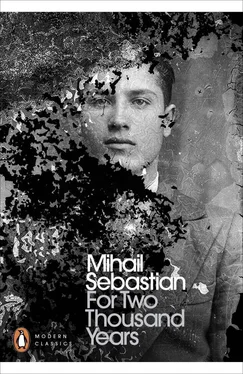‘And you?’ asks Winkler, ever calm.
‘Me? I’m here, where I should be. Wherever I am, that’s where I should be, because I’m serving the revolution. By the simple fact that I exist, the simple fact that I think. My every word is a protest, my every silence is a shout rising above your receipt-books and your smile …’
And he suddenly turns to me, pointing an accusatory finger, putting an end to my quiet corner, because my reserve clearly irritates him and because, in the end, he can’t stand the presence of an additional person who is neither friend nor foe — who is simply paying attention. S.T.H. needs an audience, an adversary, to feel he’s up against something.
Now, having issued the challenge, he waits for me to take it up, his eyes flashing cold fire. Fire ‘from the head’, I’m sure, and not from the heart. He’s tense as a folded razor, trembling in anticipation of being unsheathed. But I meet his gaze, and return it, though I feel it burning, and keep quiet. I let the silence grow, until it must shatter under its own weight.
He awaits a gesture, a sign, the start of a reply, something that will let him explode without being silly, but I’m determined not to help him out in any way, and all his violence, all his fury, is vain, useless.
But S.T.H. does not lose the match. Anybody else in his situation would have, but not him. He shakes off a lingering frown, passes his hand over his head, steps towards me and, in a tone that is surprisingly melodious and friendly after his previous vehemence, says:
‘Won’t you join me at the pictures this evening?’
S.T. Haim, my good friend, how well we play our roles, and how sadly.
*
I took my leave of S.T.H. last night and at seven-thirty this morning he was knocking on my door (when did he sleep? when did he get up?) so that I’d see the message he’d slipped under it … Then I heard him stomping down the stairs.
I wish to disturb you. Your complacency horrifies me. Montaigne, of whom you spoke last night, is heresy. Stendhal, a frivolity. If that’s all it takes for you to sleep peacefully, all the worse for you. I wish you long, dark periods of insomnia.
‘I wish to disturb you.’ If he’s taken that from Gide, he’s ridiculous. If he came up with it himself, he’s doubly so.
S.T. Haim, charged by destiny to summon me to my duty! S.T. Haim, called to shake me up and to remind me of the tragedies I’ve run from, Montaigne under my arm!
The messianic impulse and psychological insight are incompatible. S.T.H. is a missionary with no notion of what is going on in the people around him.
He wishes to disturb me. And I’d like to find a stone on which to lay my head.
Had I a sense of mission like his, I would do my best to bring calm to the situations and consciences around me. And most of all to that of S.T.H., who is a weary lunatic, a child under the spell of illusions.
‘S.T. Haim,’ I would say to him, ‘you’re worn out. Stop, sit still for an hour. Look around. Touch this and observe that it’s a bit of stone. Hold this in your hand and know it’s a piece of wood. Look, a horse, a table, a hat.
‘Believe in these things, live with them, get used to regarding them normally, without looking for shimmering phantoms in them. Return to these sure, simple things, resign yourself to living with them, with their low horizons, in their modest families. And look around, entrust yourself to the seasons, to hunger, to thirst: life will get along fine with you, as it calmly does with a tree, or an animal.’
But who will say these same things to me? And who will teach me how to teach the others?
*
Let’s presume that the hostility of anti-Semites is, in the end, endurable. But how do we proceed with our own, internal, conflict?
One day — who knows — we may make peace with the anti-Semites. But when will we make peace with ourselves?
*
It’s not easy to spend days or weeks running from yourself, but it can be done. You get into mathematics and Marxism like S.T.H., become a Zionist like Winkler, read books as I do, chase women. Or play chess, or else beat your head against a wall. But one day, in a careless moment, your own heart will be revealed to itself, as though you had turned a corner and collided with a creditor you had sought to avoid. You behold yourself and perceive your vain evasions in this prison without walls, doors or bars — this prison that is your life.
You can never be vigilant enough. Some are better at pretending than others. Some keep it up for years, others for just a few hours! It ends for all in an inevitable reversion to sadness, like returning to the earth.
For some reason, after so many years, last night I was remembering my grandfather on my mother’s side. I see him at his work-table, among thousands of springs, screws, cogs, and the faces and hands of watches. I see him leaning over them, a watchmaker’s monocle clamped as always in the socket of his right eye, an exacting master casting spells with his long-fingered hands over the world of mechanical wonders he ruled, putting it in motion.
On that monstrous table, which as a child I was forbidden to go near (a missing cog meant the onset of chaos), he organized tiny autonomous worlds, tiny abstract entities from those minuscule dots of metal, which came together as a precise, strict, ordered harmony of hundreds of rhythmic voices in fine, ticking music. Under the glass of every watch-face lay a planet with its own discrete life, indifferent to what went on beyond it, and the glass seemed specially made to separate it from that ‘beyond’.
Though I sensed he was restless, the old man was truly enviable for the peace he enjoyed among the metal beings his hand created. He lived under their spell for hours, days, years. Yet his craft was surely also an escape, a refuge. And perhaps he ran from himself, and was in terror that he would never encounter his true self.
And so, in the evening, when darkness fell and he had risen suddenly from the workbench over which he had sat silently all day, there was no pause, no restful smile on the face that gentle man. He was always hurrying. Why was he hurrying? Where was he hurrying to?
He would get his hat and coat and walking stick, say something in passing and hurry into the street, leaving the door open, and to the synagogue across the road. There he would rush about with the same harried air, shaking hands here and there, and finally come to a stop before his prayer stand. There he would recover his composure, leaning over an open book, as tensed and silent as he was before the tiny wheels of a clock. Many times I watched him there, reading. He seemed immersed in confecting more tiny mechanisms, and the letters in the book — terribly small — looked like more tiny parts to be organized by his eye, to be called forth from nothingness, from stillness. At home were clocks, here were ideas, and both were abstract, cold and exact, subject to the will of a man trying to forget himself. Did he succeed? I don’t know. His face was at times illuminated from beyond, in expectation of what — or despairing of what — I am unable to say.
At least sixty years of life and twenty of death separate us. Even more — many more. He lived in the Middle Ages and I live today. We are separated by centuries. I don’t read the books he read or believe the things he believed in, I am surrounded by different people and have other preoccupations. And yet today I feel I am his grandson, his direct descendant, heir to his incurable melancholy.
*
Why do we, who rebel against ourselves so often, for so many reasons, never revolt against our taste for catastrophe, against our kinship with pain?
There is an eternal amity between us and the fact of suffering, and more than once, in my most lamentable moments, I have been surprised to recognize the mark of pride in this suffering, the indulging of a vague vanity. There is perhaps something tragic in this, but to the same degree it also shows an inclination for theatricality. Indeed, in the very hour when I am deeply sad I sense, subconsciously, the metaphysical tenor of my soul taking the stage.
Читать дальше












